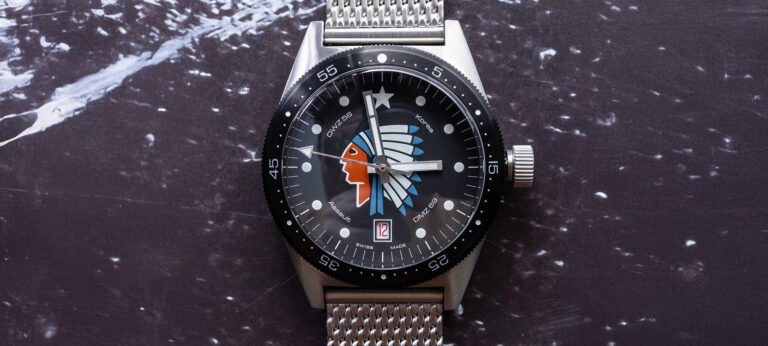Editor’s pick — Accessory quick take: key highlight (movement/specs for watches, materials/finish, limited run, pricing tier) in 1–2 lines.

Fossil Group, once one of the biggest watchmakers in the world, is financially restructuring in a legal process in the U.K. as well as U.S. bankruptcy court, as the retailer and owner of the historic Swiss marque Zodiac and the maker of mass market timepieces for a slew of well-known fashion brands, including Michael Kors, seeks breathing room from creditors. The filing comes after Fossil’s sales declined and its financial losses increased as it abandoned a major push into smartwatches and is now facing a downturn in gross margins that company executives blame on U.S. tariff and trade policy.
Fossils’ bankruptcy court filing underscores the difficulties that manufacturers and retailers of relatively low-priced, mass market timepieces are facing as economic concerns prompt some consumers to delay discretionary purchases on non-essential goods, and the global watch industry accelerates a shift to higher quality and more expensive watches produced at lower volumes. At the same time, smartwatches produced by industry giants, including Apple and Samsung, have come to dominate both the category and the wrists of many value-conscious consumers, taking market share from manufacturers like Fossil and its brands. What may have finally tipped Texas-based Fossil into seeking creditor protection, however, are the changes to U.S. tariff and trade policies impacting the cost of importing its mostly made-in-Asia products, according to filings in U.S. Bankruptcy Court.

At its peak, Fossil was producing an estimated 26 million watches per year, according to a 2014 profile of the company. That compares to about 15.5 million watches produced by the entire Swiss watch industry in 2024. In 2015, Fossil acquired the tech wearables company Misfit, and in 2017, it planned to launch as many as 300 new smartwatch or wearable products and models under licensing brand deals ranging from Armani Exchange and Adidas, to Burberry, Skagen, and Hald.
The massive push into smartwatches and wearables, however, was eventually abandoned, and Fossil, in its 2025 second-quarter earnings report, said it had decided to exit the category, leading to lower sales and store closures. The company owns the Swiss brand Zodiac, historically known for its colorful dive watches, as well as Swiss Technology Production or STP, a Swiss-based watch movement maker that produces mechanical watch movements for Zodiac, Fossil brands, and other watchmakers.

In a filing with the United States Bankruptcy Court in the Southern District of Texas, the company outlines mounting losses and declining sales amid what it calls “an extremely challenging environment.” In 2022, Fossil’s business generated approximately $1.7 billion in sales while posting a net loss of approximately $44 million, the company says. By 2024, sales had declined to $1.1 billion, with the net loss worsening to about $101 million. Fossil says that the watch retail sector has suffered significant disruption and competition from smartwatches and wearables made by Apple and Samsung, as well as smartphones in general.
As of July 2025, Fossil operated 214 stores worldwide and employed about 4,500 people. Its products are sold in about 130 countries through retail, wholesale, and direct-to-consumer channels. Fossil Group shares trade on the Nasdaq in the U.S., and its current market value is about $112 million, down from a one-time peak of about $2.7 billion.

A declaration by Fossil Chief Financial Officer Randy Greben, filed in the U.S. bankruptcy court last month, outlines the impact U.S. tariffs are taking on its business as it tries to refinance its debt obligations and reorganize its operations. “Changes to U.S. tariff policy and the resulting uncertainty in the markets negatively impacted the Company Group’s business and its efforts to implement a strategic refinancing transaction,” Fossil says in the filing.
Fossil said that most of its products are assembled or manufactured overseas, with the substantial majority of those products imported from China. Tariffs imposed on imported goods reduced Fossil’s gross margin by approximately 80 basis points in its second quarter financial results, the company says, even as it has tried to reduce the impact by raising prices and shifting production and sourcing to other locations. Fossil had tried to sell some of its brands to reduce debt and was close to finalizing a deal, but failed to finalize a transaction amid the uncertain economic conditions, it said in court filings.

While Fossil is based in the U.S., with its products mostly manufactured in Asia, and with retail operations in North America and Europe, it chose to file for creditor protection and financial restructuring in a U.K. court. The company is likely ”venue shopping,” according to the Financial Times, as U.K. courts can sometimes grant more favorable outcomes to companies and stakeholders, including assigning more value to a company’s equity in the restructuring process compared to U.S. bankruptcy courts. Fossil is filing under Chapter 15 proceedings in U.S. court that would give precedence to the foreign restructuring process in the U.K.
The legal process should allow Fossil and its related companies, including Zodiac and STP, to continue operating, as the company restructures its debt and operations.
For more information click here.
Source: www.hodinkee.com — original article published 2025-11-03 18:00:00.
Read the full story on www.hodinkee.com → [source_url]



